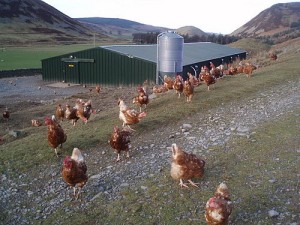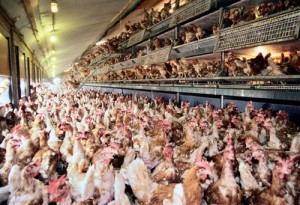Chicken farming, is it right, or a necessity?

There are around 50 billion chickens in the world but most live for 6 weeks, if farmed for meat, or 72 weeks for eggs. This compares to a natural lifespan of 6 years.
Some say this is horrific cruelty, others, an efficient use of resources to feed the world. Most people however only see the meat, or eggs, on the supermarket shelf and know very little about how they were produced.
So here are a 10 facts about eggs and chickens.
1. Selective breeding has produced in 2 types of chicken, special breeds for egg production and others for meat production.
2. Meat producing chickens convert food to meat and are killed after 6 weeks, in broiler houses or, 14 weeks if free range
3. If they are not killed when mature they can’t stand as the breast meat is too heavy
4. Egg laying chickens convert food to eggs, start laying at 10 weeks and are killed at 72 weeks
5. It is more economic to kill an egg laying bird at 72 weeks than feed it for a few weeks until it starts laying again at a lower rate
6. Male egg laying chickens are killed when 1 day old as they can’t produce eggs
7. Egg laying hens that are killed are minced in to sausages, burgers, ready meals, dog snacks and food.
8. Intensive farming of chickens requires anti-biotic use and growth promoters
9. Intensive chicken farms can harbour diseases such as salmonella, E.coli and campylobacter
10. Despite incredible efficiencies in the egg production industry local, real, free range eggs are often cheaper than, factory free range, in the supermarket.
How many people know all these facts about food we eat nearly every day? And now you know them will you reconsider what you eat?
I am a 5th generation farmer and started BigBarn 15 years ago to reconnect consumers with the producers of their food and encourage trade and communication, like knowing how our eggs and chickens are produced.
Our mission is to to get farmers a better deal than the average 9p in every £1 they get on food in the supermarket, and consumers get cheaper food by buying direct. Like local free range eggs.
I am excited that many of the 6,500 food producers and retailers on our local food map are cheaper than the supermarket for many products by cutting out the supply chain cost. But frustrated by the power of marketing and supermarket dominance to hide what happens in the food industry, make huge profits and not give consumers a good deal. Is this the cost of convenience?
Now that you know the facts where will you buy your eggs and chicken? Trust big business and government regulation to provide ‘cheap’ safe food in a one stop shop near you? Or find your local producer/retailer for real food. Or become a vegetarian?
I highly recommend you change to local. Find out where your food comes from and encourage more production by putting your money in the local economy. You should get fresher, better food often cheaper. And make chickens happy! For Ideas on how to change see our Make One Change Campaign.


